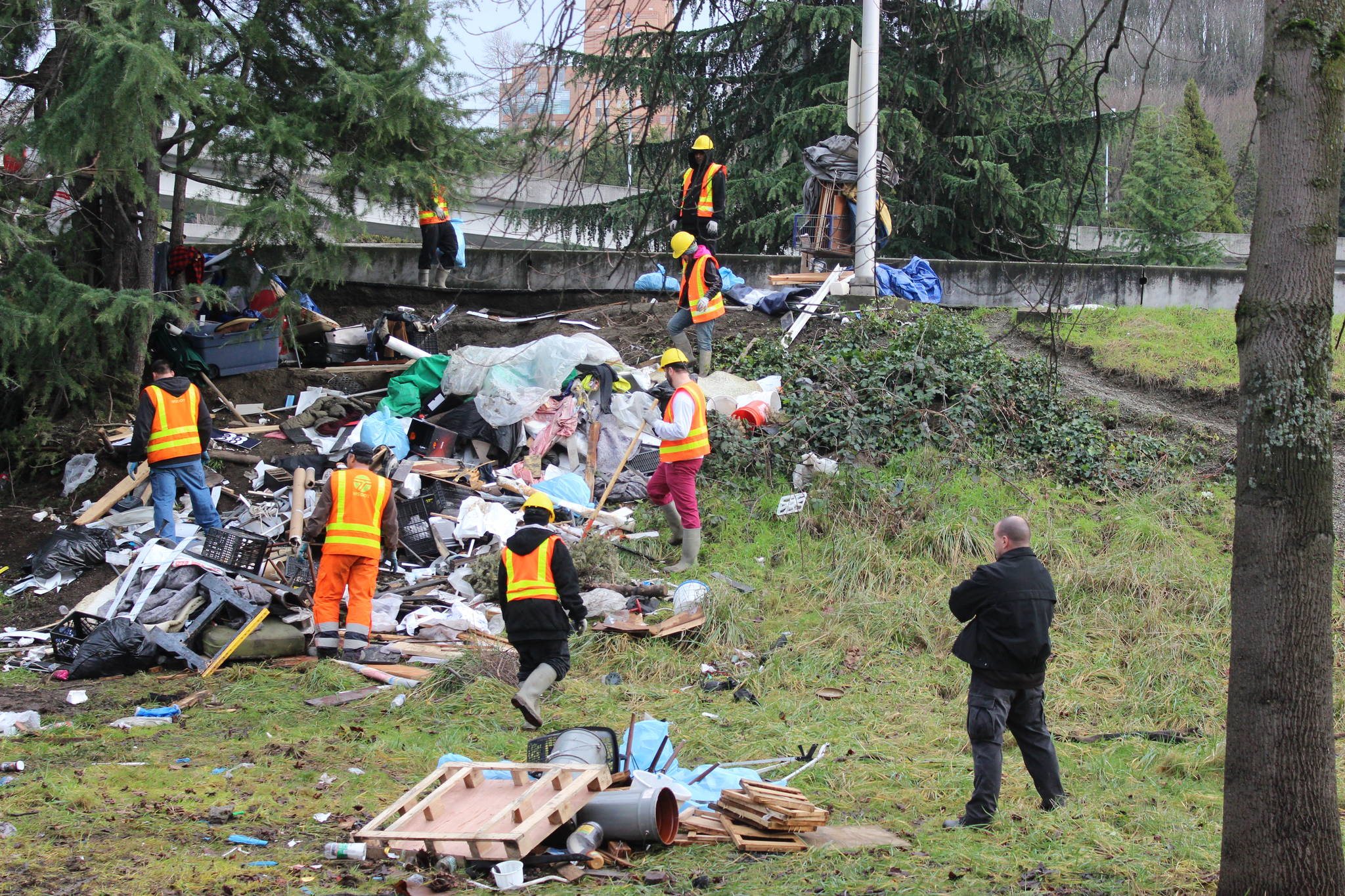Sparks and mud flew Wednesday night at the Human Services Coalition candidate forum between the two men jockeying for Seattle City Attorney in the November 7 election. The forum’s focus on poverty and homelessness made for some truculent trash talk, thanks to challenger Scott Lindsay’s background as the former manager of unauthorized homeless encampment evictions under former Mayor Ed Murray.
It didn’t take long for the candidates’ shared veneer of Seattle Nice to crumble. Incumbent Pete Holmes accused Lindsay of using prison labor to evict homeless encampments. Lindsay accused Holmes of squandering the resources of his office. In a cloying demonstration of performative humility, both men accused themselves of being privileged.
In his criticism of Holmes, Lindsay sought to portray himself as equally progressive but more efficacious. “After eight years in office, where’s the beef?” he said, borrowing a decades-old advertising catchphrase from Wendy’s. “I think that Mr. Holmes and I agree on a lot of things, but we have to actually deliver.”
Lindsay sought to portray himself as a fresh face that can rejuvenate an atrophying Attorney’s office. “The huge majority of repeat offenders who are cycling through [our criminal justice] system are struggling with addiction and homelessness,” said Lindsay. “That’s the status quo. That’s after eight years of Mr. Holmes in office. I want to change that. I think we can do much better.”
But it was Lindsay’s own history as the architect as the city’s current homeless policies that was the focus of much of the debate. Many advocates have called Lindsay’s efforts heartless and disruptive to the little stability those on the streets have. But Lindsay, speaking to a room full of such advocates, argued that his work under Murray should count in his favor.
Lindsay credited himself with reforming the mayor’s homeless evictions policy. “I took action. I didn’t stand by” in the face of the homelessness crisis, he said. “I took action and I proposed to the mayor the creation of the Navigation Team,” said Lindsay, referring to the team of police and outreach workers who conduct the city’s ongoing mass evictions of unauthorized homeless encampments. Lindsay recalled the plan he proposed to Murray: “Instead of sending police officers to say, ‘You’re out,’ let’s actually send outreach workers with those police officers to problem solve at the individual level…
“Today, that program is working to help get people off the streets,” said Lindsay. We have previously reported on the help that Lindsay and his Navigation Teams are providing to homeless campers—for example, here, here, here, here and here.
The debate between Holmes and Lindsay was the last of four that night (the others were for mayor and two city council seats), but it quickly became the most contentious. Lindsay accused Holmes of being too slow to support Law Enforcement Assisted Diversion (LEAD), an arrest-diversion program that’s had great success directing petty criminals away from court and into social services. Holmes disputed this, saying that his office has been involved since LEAD’s inception. Holmes accused Lindsay of lying: “If you’re going to add content [to a debate] that is false, that’s not helpful…It does not help to misstate the fact.”
Holmes also accused Lindsay of using prison labor to evict homeless encampments. “This city, with the [homeless encampments eviction] program that Mr. Lindsay was the point person on, was starting to use prison labor to do those cleanups,” said Holmes.
“That’s unfair,” interjected Lindsay.
“It’s not unfair, it’s absolutely true,” replied Holmes. “The City Attorney’s role was to stop that. Talk about institutional racism! Using prison labor to clean up homeless encampments. I had to stop that.” (According to The Seattle Times, city authorities said they phased out prison labor at homeless evictions last year, following criticism from the Seattle Human Rights Commission.)
“That’s gross and untrue,” retorted Lindsay. “…The City of Seattle had been using community corrections labor for a decade prior to me even looking at this.” He again credited himself with reforming sweeps: “What I advocated for is, if the city is going to remove somebody from an unauthorized encampment, they must make sure that there is housing and shelter available for that person. In April of this year, the Department of Finance and Administrative Services actually put that rule into effect.”
As we previously reported, the city’s homeless encampment sweeps policy is currently the subject of a lawsuit filed by homeless campers who are represented by the state ACLU. According to the lawsuit, outreach with offers of shelter and assistance was not offered in nearly half of the sweeps that occurred in the first part of 2017, and about 60 percent of sweeps since January 2016 have been conducted without the 72 hour notice city rules ostensibly require.
cjaywork@seattleweekly.com
This post has been updated, and the photo caption has been edited for clarity.








